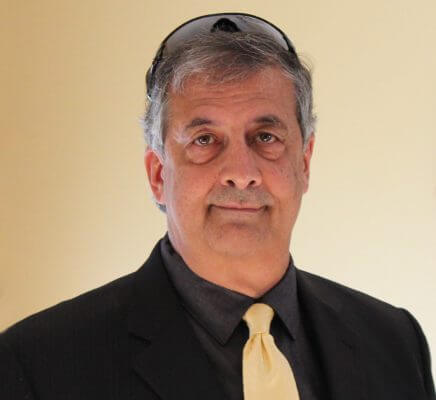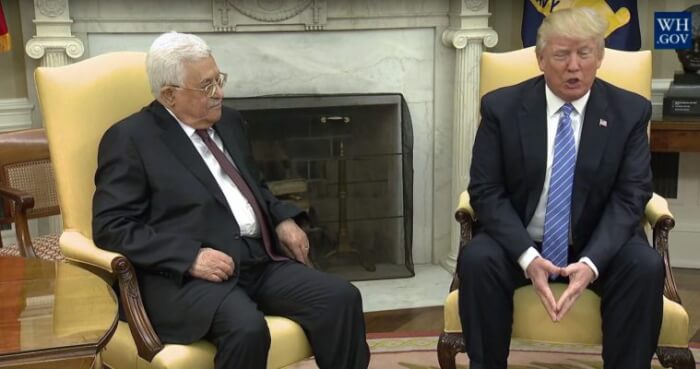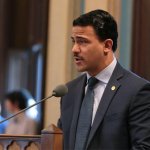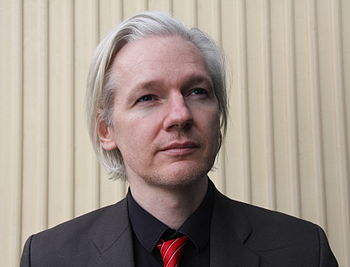President Trump pushes for Palestine agreement
President Donald Trump greeted Palestinian President Mahmoud Abbas at the White House Wednesday May 3, 2017, and vowed to push hard for a final peace agreement. Trump, who many claimed would abandon Palestinian rights, has remained faithful to the needs of Palestinians despite expressing strong support for Israel
By Ray Hanania

American President Donald J. Trump has shown a balanced approach to addressing the needs and concerns of both Israelis and Palestinians despite assertions by his critics and haters that he would abandon the Palestine cause.
Trump, who has been vilified by extremists and rejectionists for his campaign rhetoric, defied the haters who predicted he would be a shill for Israel. Instead, Trump has strongly embraced Israel’s right to exist and security demands, but has also drawn a clear line on issues of Israel’s illegal settlements, land confiscations and the need for the United States to continue to push for a peace accord that both sides will embrace.
In his first remarks after being elected president, Trump greeted Israel’s rightwing Prime Minister Benjamin Netanyahu by offering concern for Israel’s settlement expansion and by publicly stating that he could not only support a “Two State” solution but also a “One State” solution, shocking Israelis but being mostly ignored by skeptics who lead the Palestinian rejection front.
Abbas has shown he can be presidential leading Palestinian Democracy while being tough on extremism, pressuring Hamas to end its longstanding role as an anti-peace spoiler that has sought a policy that embraces its own selfish goals of creating an Islamic State any territories surrendered by Israel.
Trump praised Abbas, saying, “I’m committed to working with Israel and the Palestinians to reach an agreement. But any agreement cannot be imposed by the United States, or by any other nation. The Palestinians and Israelis must work together to reach an agreement that allows both peoples to live, worship, and thrive and prosper in peace. And I will do whatever is necessary to facilitate the agreement — to mediate, to arbitrate anything they’d like to do. But I would love to be a mediator or an arbitrator or a facilitator. And we will get this done.”

For his part, Abbas thanks Trump and reiterated the moderate Palestinian line defined by numerous past agreements that Israel has broken int he past, saying, “Our strategic option, our strategic choice is to bring about peace based on the vision of the two-state — a Palestinian state with its capital of East Jerusalem that lives in peace and stability with the state of Israel based on the borders of 1967.”
Since the peace process began in 1993, Hamas has used every opportunity to undermine the agreement rejecting negotiations, rejecting compromise and rejecting calls for a “Two State” solution. Hamas turned to suicide bombings to damage the support Palestinians have had in the International community and Hamas violence has given Israel the mandate to reject peace and expand its land confiscations and brutality of civilians in the occupation.
Many observers believe that Palestinians have been handicapped by Hamas which has prevented not only a Two-State Solution by using horrendous acts of violence and civilian murder to block peace, but has also prevented Palestinians from coming together as one state themselves.
If Palestinians can’t achieve a One State solution for their own people as Palestinians, how can they even demand a One State Solution in negotiations with Hamas.
For peace to work, Palestinians must reject Hamas’ religious extremism, reject the failed policies of violnce that Hamas has used to prevent peace, and embrace compromise that allows them to achieve statehood and sovereignty in the eyes of the International community.
Abbas has received support from both Egyptian President Al-Sisi and from Jordan’s King Abdullah II in prior meetings before traveling to Washington D.C. to meet with President Trump. Both al-Sisi and King Abdullah have also impressed on President Trump the need to be open to Palestinian demands for justice.
Click here to watch video of Trump-Abbas meeting.
Here are the remarks made by President Trump and President Abbas as they begin their private meetings at the White House:
Remarks by President Trump and President Abbas of the Palestinian Authority in Joint Statement
Roosevelt Room 12:15 P.M. EDT
PRESIDENT TRUMP: Thank you very much. Today I am pleased to welcome President Abbas to the White House for his first visit to Washington in quite a while.
Almost 24 years ago, it was on these grounds that President Abbas stood with a courageous peacemaker, then-Israeli Prime Minister Yitzhak Rabin. Here at the White House, President Abbas signed a Declaration of Principles — very important — which laid the foundation for peace between the Israelis and Palestinians.
The President — Mr. President, you signed your name to the first Israeli-Palestinian peace agreement. You remember that well, right? And I want to support you in being the Palestinian leader who signs his name to the final and most important peace agreement that brings safety, stability, and prosperity to both peoples and to the region.
I’m committed to working with Israel and the Palestinians to reach an agreement. But any agreement cannot be imposed by the United States, or by any other nation. The Palestinians and Israelis must work together to reach an agreement that allows both peoples to live, worship, and thrive and prosper in peace. And I will do whatever is necessary to facilitate the agreement — to mediate, to arbitrate anything they’d like to do. But I would love to be a mediator or an arbitrator or a facilitator. And we will get this done.
Peace also means defeating ISIS and other terrorist groups. These groups are a threat to all people who cherish human life. I know President Abbas has spoken out against ISIS and other terrorist groups, and we must continue to build our partnership with the Palestinian security forces to counter and defeat terrorism.
I also applaud the Palestinian Authority’s continued security coordination with Israel. They get along unbelievably well. I had meetings, and at these meetings I was actually very impressed and somewhat surprised at how well they get along. They work together beautifully. But there cannot be lasting peace unless the Palestinian leaders speak in a unified voice against incitement to violate — and violence and hate. There’s such hatred. But hopefully there won’t be such hatred for very long. All children of God must be taught to value and respect human life, and condemn all of those who target the innocent.
As part of our efforts to move forward toward peace today, we will also discuss my administration’s effort to help unlock the potential of the Palestinian people through new economic opportunities.
Lastly, I want to note the positive ongoing partnership between the United States and the Palestinians on a range of issues — private sector development and job creation, regional security, counterterrorism, and the rule of law — all of which are essential to moving forward toward peace.
I welcome President Abbas here today as a demonstration of that partnership, that very special partnership that we all need to make it all work. And I look forward to welcoming him back as a great marker of progress and, ultimately, toward the signing of a document with the Israelis and with Israel toward peace. We want to create peace between Israel and the Palestinians. We will get it done. We will be working so hard to get it done. It’s been a long time, but we will be working diligently. And I think there’s a very, very good chance, and I think you feel the same way.
Mr. President, thank you very much.
PRESIDENT ABBAS: (As interpreted from Arabic.) Mr. President, Your Excellency, I would like to thank you for this honorable invitation to come and meet with you, and I look much forward to working with you in order to come to that deal, to that historic agreement, historic deal to bring about peace.
Mr. President, our strategic option, our strategic choice is to bring about peace based on the vision of the two-state — a Palestinian state with its capital of East Jerusalem that lives in peace and stability with the state of Israel based on the borders of 1967.
Mr. President, for us to bring about a comprehensive and just peace based on the two-state solution, such matter would give a great impetus to the Arab peace initiative and the other initiatives, international initiatives — as well as it enables to fight and deter terrorism, and fight the criminal ISIS group, ISIS — that is totally innocent and has nothing to do with our noble religion. And that also, if we create peace that is just and comprehensive, that will also lead the Arab and the Islamic countries to have normal relations with Israel based, as stipulated in the previous Arab summits, the latest of which was the Arab summit in Jordan.
Mr. President, we believe that we are capable and able to bring about success to our efforts because, Mr. President, you have the determination and you have the desire to see it become to fruition and to become successful. And we, Mr. President, inshallah, God willing, we are coming into a new opportunity, a new horizon that would enable us to bring about peace in that regard.
Mr. President, as far as a permanent solution, we believe that this is possible and able to be resolved. I am firmly believing that this is possibly — we are able to resolve it. And in that, I also believe that we will be able to resolve the issue of the refugees and the issue of the prisoners. According to the international law, according to the terms of international law, the international legitimacy, and the various relevant references and terms of reference in that regard, and based on what is stipulated in the previous treaties and agreements, that no unilateral steps must be taken to get ahead of the agreement and discussing those issues.
Mr. President, it’s about time for Israel to end its occupation of our people and of our land after 50 years. We are the only remaining people in the world that still live under occupation. We are aspiring and want to achieve our freedom, our dignity, and our right to self-determination. And we also want for Israel to recognize the Palestinian state just as the Palestinian people recognize the state of Israel.
Mr. President, I affirm to you that we are raising our youth, our children, our grandchildren on a culture of peace. And we are endeavoring to bring about security, freedom and peace for our children to live like the other children in the world, along with the Israeli children in peace, freedom and security.
Mr. President, I bring with me today the message of the suffering of my people, as well as their aspiration and hope — the hopes and aspirations of the Palestinian people from the Holy Land, from that land where the three monotheist religions thrived, and the Jewish faith, the Christian faith and the Muslim faith, where they all coexist together to foster it in an environment of security, peace and stability, and love for all.
Mr. President, I believe that we are capable under your leadership and your stewardship to — your courageous stewardship and your wisdom, as well as your great negotiating ability, I believe, with the grace of God and with all of your effort — we believe that we can be partners, true partners, to you to bring about a historic peace treaty under your stewardship to bring about peace.
(In English.) Now, Mr. President, with you we have hope.
PRESIDENT TRUMP: So we’re going to start a process. We’ve spoken to Bibi Netanyahu. We’ve spoken to many of the great Israeli leaders. We’ve spoken with many of your great representatives. Many of them are here today for lunch with us. We’ll start a process which hopefully will lead to peace. Over the course of my lifetime, I’ve always heard that perhaps the toughest deal to make is the deal between the Israelis and the Palestinians. Let’s see if we can prove them wrong. Okay?
PRESIDENT ABBAS: Okay.
PRESIDENT TRUMP: Good. Thank you. Thank you very much, everybody. Thank you.


- Israelisnipers shooting and killing hospital workers in Gaza - December 11, 2023
- CAIR Condemns Israeli Executions of Wounded, Unarmed Palestinian in West Bank - December 11, 2023
- Arab and Muslim American voters face a “simple choice” between Biden’s inhumanity and Trump’s edgy politics - December 9, 2023























